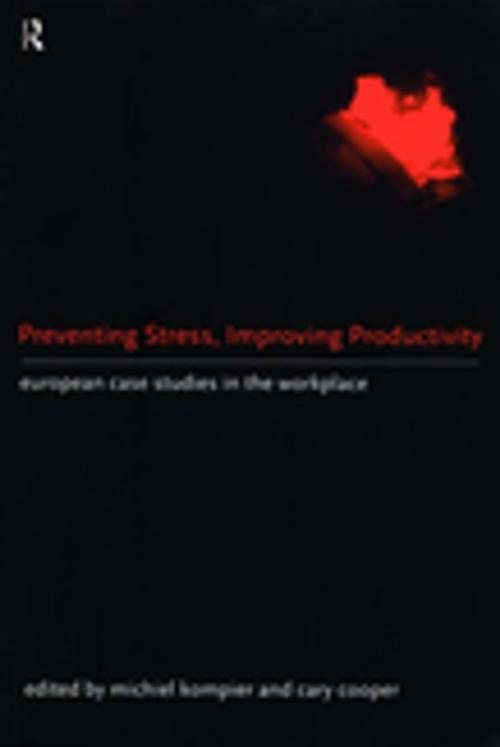Preventing Stress, Improving Productivity
European Case-Studies in the Workplace
Nonfiction, Health & Well Being, Psychology, Occupational & Industrial Psychology| Author: | ISBN: | 9781134708291 | |
| Publisher: | Taylor and Francis | Publication: | November 12, 2012 |
| Imprint: | Routledge | Language: | English |
| Author: | |
| ISBN: | 9781134708291 |
| Publisher: | Taylor and Francis |
| Publication: | November 12, 2012 |
| Imprint: | Routledge |
| Language: | English |
In a representative study made of European workers, twenty-eight per cent of employees reported that stress affects their health and their performance at work. Occupational stress is a serious problem for the performance of individuals, organisations and as a consequence, for national economies. Preventing Stress, Improving Productivity investigates the ways in which companies can combat stress by changing the working environment rather than only treating individual employees with stress symptoms.
Costs and benefits of stress prevention are discussed, with an emphasis on appraoches that involve both the work situation and the individual worker. The heart of the book consists of eleven European country chapters, each overviewing the current status with respect to occupational stress and its prevention in that country and then presenting one detailed case study an example of good preventive practice.
Preventing Stress, Improving Productivity identifies five factors that are critical for a stress reduction programme to work, both in terms of employee health and well-being and from a financial point of view. Successful strategies combine participation from workers and support from top management. Useful as a reference for psychologists, human resource managers, occupational physicians, ergonomists and consultants, this book will also be an invaluable aid to managers in the day-to-day running of organisations.
In a representative study made of European workers, twenty-eight per cent of employees reported that stress affects their health and their performance at work. Occupational stress is a serious problem for the performance of individuals, organisations and as a consequence, for national economies. Preventing Stress, Improving Productivity investigates the ways in which companies can combat stress by changing the working environment rather than only treating individual employees with stress symptoms.
Costs and benefits of stress prevention are discussed, with an emphasis on appraoches that involve both the work situation and the individual worker. The heart of the book consists of eleven European country chapters, each overviewing the current status with respect to occupational stress and its prevention in that country and then presenting one detailed case study an example of good preventive practice.
Preventing Stress, Improving Productivity identifies five factors that are critical for a stress reduction programme to work, both in terms of employee health and well-being and from a financial point of view. Successful strategies combine participation from workers and support from top management. Useful as a reference for psychologists, human resource managers, occupational physicians, ergonomists and consultants, this book will also be an invaluable aid to managers in the day-to-day running of organisations.















